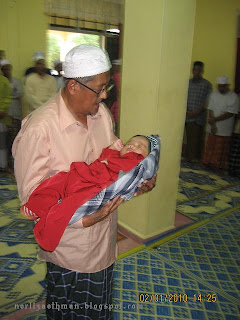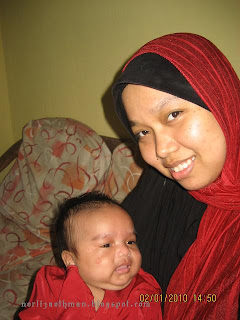Semalam.. waktu maghrib..
Husna ngan Aliff dok kat ruang tamu.. Husna dengan channel Astro Ceria nye..(nak tengok kartun) and Aliff dok terlentang je kat atas tilam (kat ruang tamu jugak..)
Aku masuk bilik, call en.suami yang kat ofis, tanye2 kol bape die nak balik plus pesan beli makanan kat pasar malam. Habis call nak ambil wudhuk untuk solat maghrib.. sebelum masuk toilet, dengan sengaja, aku jenguk Husna & Aliff.. tengok2 Husna tekup muka Aliff ngan bantal besar.. terkejut besar aku..berlari nak angkat bantal tu.. syukur Aliff tak ape2..
aku : Husna sayang adik takkk??(*marah)Husna : sayang..aku : habih nape letak bantal kat muka adik??Husna : *nangis*aku : Husna tak sayang adik, ummy bagi adik kat orang lain nak??Husna : tak nak..*nangis*ya, aku tau Husna sayang kat Aliff cuma cara sayang nya tu terlalu bahaya..
kesian jugak kat Husna kene bantai ngan aku.. mungkin die nak bergurau je dengan Aliff..
Husna sedih..aku pun sama..
lama aku terduduk..terdiam..berfikir..apakah kasih sayang kami (ummy & ayah) pada Husna nampak berkurangan..adakah kami terlalu melebihkan Aliff??..
kalau aku terlepas pandang..hmmm tak tahu apa akan jadi......
'Husna, apalah yang ummy patut buat...'
setelah aku google, aku jumpa artikel kat bawah ni.. betul jugak apa yang tertulis kat artikel tu.. ya, banyak lagi ilmu keibubapaan yang perlu aku cari..
 Husna & Aliff
Husna & AliffHow Do I Deal with a Jealous Sibling? *source
From Elizabeth Pantley
Think about it: Before the baby entered your family, your toddler was told he’d have a wonderful little brother to play with, and how much fun it would be. Then the little brother is born and your toddler is thinking, “Are you kidding me? This squirming, red-faced baby that takes up all your time and attention is supposed to be FUN?” He then “plays” with the baby in the only ways he knows how. He plays catch. You yell at him for throwing toys at the baby. He plays hide-and-seek. You yell at him to get the blanket off the baby. He gives the kid a hug, and you admonish him to be more careful. Is it any wonder that your toddler is confused?
Teach: Your first goal is to protect the baby. Your second, to teach your older child how to interact with his new sibling in proper ways. You can teach your toddler how to play with the baby in the same way you teach him anything else. Talk to him, demonstrate, guide and encourage. Until you feel confident that you’ve achieved your second goal, however, do not leave the children alone together. Yes, I know. It isn’t convenient. But it is necessary, maybe even critical.
Hover: Whenever the children are together, “hover” close by. If you see your child about to get rough, pick up the baby and distract the older sibling with a song, a toy, an activity or a snack. This action protects the baby while helping you avoid a constant string of “Nos,” which may actually encourage the aggressive behavior.
Teach soft touches: Teach the older sibling how to give the baby a back rub. Tell how this kind of touching calms the baby, and praise the older child for a job well done. This lesson teaches the child how to be physical with the baby in a positive way.
Act quickly: Every time you see your child hit, or act roughly with the baby, act quickly. You might firmly announce, “No hitting, time out.” Place the child in a time-out chair with the statement, “You can get up when you can use your hands in the right way.” Allow him to get right up if he wants – as long as he is careful and gentle with the baby. This isn’t punishment, after all. It’s just helping him learn that rough actions aren’t going to be permitted.
Demonstrate: Children learn what they live. Your older child will be watching as you handle the baby and learning from your actions. You are your child’s most important teacher. You are demonstrating in everything you do, and your child will learn most from watching you.
Praise: Whenever you see the older child touching the baby gently, make a positive comment. Make a big fuss about the important “older brother.” Hug and kiss your older child and tell him how proud you are.
Watch your words: Don’t blame everything on the baby. “We can’t go to the park; the baby’s sleeping.” “Be quiet, you’ll wake the baby.” “After I change the baby I’ll help you.” At this point, your child would just as soon sell the baby! Instead, use alternate reasons. “My hands are busy now.” “We’ll go after lunch.” “I’ll help you in three minutes.”
Be supportive: Acknowledge your child’s unspoken feelings, such as “Things sure have changed with the new baby here. It’s going to take us all some time to get used to this.” Keep your comments mild and general. Don’t say, “I bet you hate the new baby.” Instead, say, “It must be hard to have Mommy spending so much time with the baby.” or “I bet you wish we could go to the park now, and not have to wait for the baby to wake up.” When your child knows that you understand her feelings, she’ll have less need to act up to get your attention.
Give extra love: Increase your little demonstrations of love for your child. Say extra I love yous, increase your daily dose of hugs, and find time to read a book or play a game. Temporary regressions or behavior problems are normal, and can be eased with an extra dose of time and attention.
Get ‘em involved: Teach the older sibling how to be helpful with the baby or how to entertain the baby. Let the older sibling open the baby gifts and use the camera to take pictures of the baby. Teach him how to put the baby’s socks on. Let him sprinkle the powder. Praise and encourage whenever possible.
Making each feel special: Avoid comparing siblings, even about seemingly innocent topics such as birth weight, when each first crawled or walked, or who had more hair! Children can interpret these comments as criticisms.
Take a deep breath and be calm. This is a time of adjustment for everyone in the family. Reduce outside activities, relax your housekeeping standards, and focus on your current priority, adjusting to your new family size.
 cenderahati : scented candle + candle holder
cenderahati : scented candle + candle holder sampul kad : glamor nye siap ade gambo tuu
sampul kad : glamor nye siap ade gambo tuu kad ucapan : simple & elegant
kad ucapan : simple & elegant











































